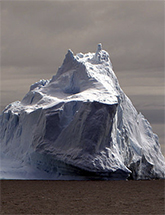World War I and the unconscious
 I was in Barnes & Noble earlier today and, intrigued by the cover of the latest Time magazine (which oddly featured a full-page photograph of Abraham Lincoln), I realized that the 150th anniversary of the beginning of the Civil War is coming up in three days (April 12, 2011). Such numerically-significant anniversaries are rare occasions for the national discourse to turn and (briefly) examine the significance of history to contemporary life. I always seem to miss these kinds of precious discussions. Currently, I’m working through Paul Fussell’s The Great War and Modern Memory and am still on the early-20th-century wavelength (oh! where was the 150th anniversary of the firing on Ft. Sumter when I was reading Paul Menand’s The Metaphysical Club and was on my Civil War “kick”?).
I was in Barnes & Noble earlier today and, intrigued by the cover of the latest Time magazine (which oddly featured a full-page photograph of Abraham Lincoln), I realized that the 150th anniversary of the beginning of the Civil War is coming up in three days (April 12, 2011). Such numerically-significant anniversaries are rare occasions for the national discourse to turn and (briefly) examine the significance of history to contemporary life. I always seem to miss these kinds of precious discussions. Currently, I’m working through Paul Fussell’s The Great War and Modern Memory and am still on the early-20th-century wavelength (oh! where was the 150th anniversary of the firing on Ft. Sumter when I was reading Paul Menand’s The Metaphysical Club and was on my Civil War “kick”?).
Fussell’s book, though, is yielding too much nutritious food for thought to put aside. In the chapter titled “Adversary Proceedings”, Fussell quotes 20th-century psychologist Carl Jung for whom the First World War was such a such a strong influence that it crept into his dreams after (and, if we are to believe his enigmatic Red Book, even before) the war:
[Jung] dreamed that he was ‘driving back from the front line with a little man, a peasant, in his horse-drawn wagon. All around us were shells exploding, and I knew that we had to push on as quickly as possible, for it was very dangerous [. . .] The shells falling from the sky were, interpreted psychologically, missiles coming from the “other side.” They were, therefore, effects emanating from the unconscious, from the shadow side of the mind [. . .] The happenings in the dream suggested that the war, which in the outer world had taken place some years before, was not yet over, but was continuing to be fought within the psyche.’
Reading this quote by Jung made me think of something that has fascinated me about psychology for some years. Specifically, it’s been a mystery to me how widely the ideas of Sigmund Freud, the founder of psychoanalysis and an iconic figure, were taken up by the Western world and how deeply ingrained some of them have become even though many of his theories were not very scientific. (more…)
leave a comment